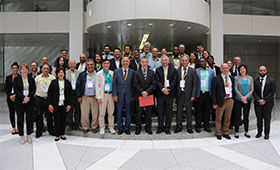Study Visit and Meeting at BIBB for UNEVOC Network and TVET Inter-Agency Group
In the context of UNESCO-UNEVOC’s TVET Learning Forum on ‘Managing skills in a time of disruption’ 2018 held in Bonn from May 24 - 25, 2018 on the UN Campus, a Study visit was arranged on 23rd of May by the BIBB.

The study visit aimed to showcase promising and practical initiatives that demonstrate TVET’s response to the disruptions of digitization, climate change and migration and demographic shift-related issues. As a positive force, such disruptions are not only opening up potential areas for innovation in TVET institutions but also offering new paths for pursuing an integrated development approach to education and training, consistent with SDG4 and its interactions with other goals.
The study visit therefore linked the theoretical inputs of the Forum to practical insights of institutions that possess the expertise and practical experience in addressing those disruptions. In a broader sense, the visit offered participants with an opportunity to gain practical knowledge of German flagship initiatives that have relevant links to the Forum’s topic. Furthermore participants’ understanding has been reinforced on what works and inspired actions to make the existing institutional approaches more effective and efficient in addressing disruptions.
The activity comprised a practice-oriented visit to the Competence Center for Digital Crafts and Trade at HWK Koblenz. The site provides a demonstration of possible operational uses of digital technologies to assist craft businesses with adapting to the future market. The practical visit was complemented by an interactive session in which the ongoing projects implemented by BIBB in the fields of disruption were explained. Participants learned about approaches for addressing the consequences of displacement of people and demographic changes in Germany, by looking at the case example "Recognition in Germany".
The participants were experts in the field of TVET, such as representatives of international organisations (some members of the TVET Inter-Agency Group), national ministries, TVET authorities, universities as well as research and training institutions.